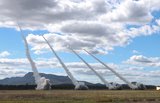Australia looks towards space with force restructure, investment and training
Australia is looking to improve its presence in space with a focus on communications and creating a dedicated segment of its defence forces committed to the domain.
The French detachment of Operation Chammal, which is supporting the US Combined Joint Task Force Operation Inherent Resolve, has begun using RECO-NG new generation reconnaissance pods to identify Daesh targets.
Manufactured by Thales, the RECO-NG is a long range, high resolution reconnaissance pod designed to enhance surveillance and intelligence imagery capabilities. It has been integrated with French Rafale fighter aircraft.
Col Benjamin Souberbielle, a commander in the French Air Force, said: ‘The RECO-NG makes our missions more flexible… The two aircraft patrol with the ability to achieve three complimentary effects: ground support, air defence and intelligence.’
Each RECO-NG unit is approximately 4.6m long, weighs 1,100kg and is attached underneath the airframe fuselage of the aircraft. It has been successfully used to locate weapons caches, tunnels, vehicles and training camps used by Daesh.

Australia is looking to improve its presence in space with a focus on communications and creating a dedicated segment of its defence forces committed to the domain.

The Portuguese company’s naval communications system is in service across more than a dozen countries. It has turned to its home nation for support in developing a new vehicle based C2 system.

The Vision4ce Deep Embedded Feature Tracking (DEFT) technology software is designed to process video and images by blending traditional computer vision with artificial intelligence (AI) algorithms to present actionable information from complex environments.

Persistent Systems has been cleared by National Security Agency (NSA) to transmit sensitive data on commercial networks. The devices are added to the NSA’s Commercial Solutions for Classified (CSfC) component list which also includes other companies’ products providing the same security.

The release of the UK’s Strategic Defence Review (SDR) has been long promised as mid-year. It is possible it could be as early as 2 June although the UK Ministry of Defence (MoD) continues to play its cards close to its chest.

Intelsat outlines how its multi-orbit SATCOM architecture is enhancing connectivity and resilience for special operations forces operating in degraded and contested environments.